Module 11 Way of life Unit 1 In China ,we open a gift later. 教学课件
文档属性
| 名称 | Module 11 Way of life Unit 1 In China ,we open a gift later. 教学课件 |  | |
| 格式 | zip | ||
| 文件大小 | 2.9MB | ||
| 资源类型 | 教案 | ||
| 版本资源 | 外研版 | ||
| 科目 | 英语 | ||
| 更新时间 | 2015-04-21 17:29:59 | ||
图片预览

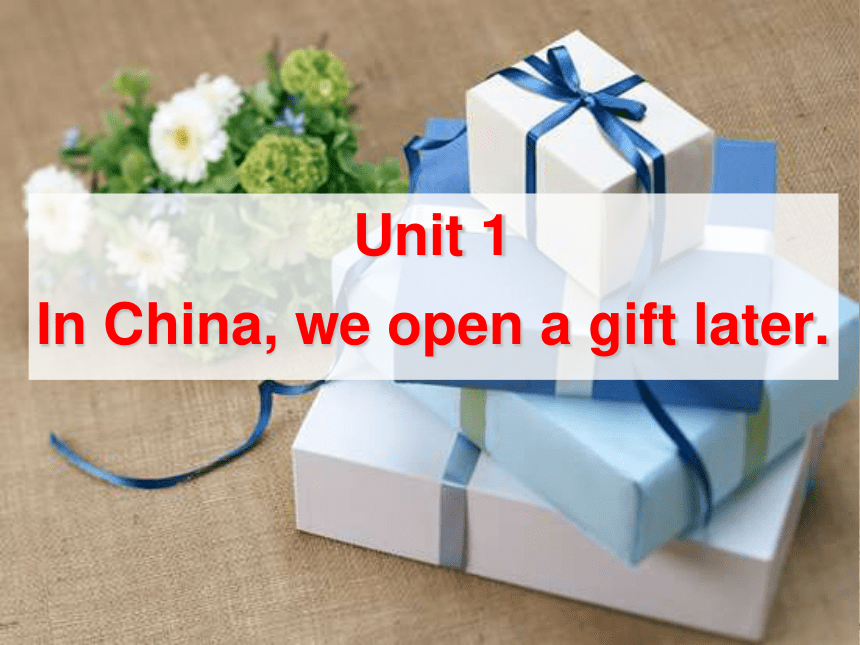


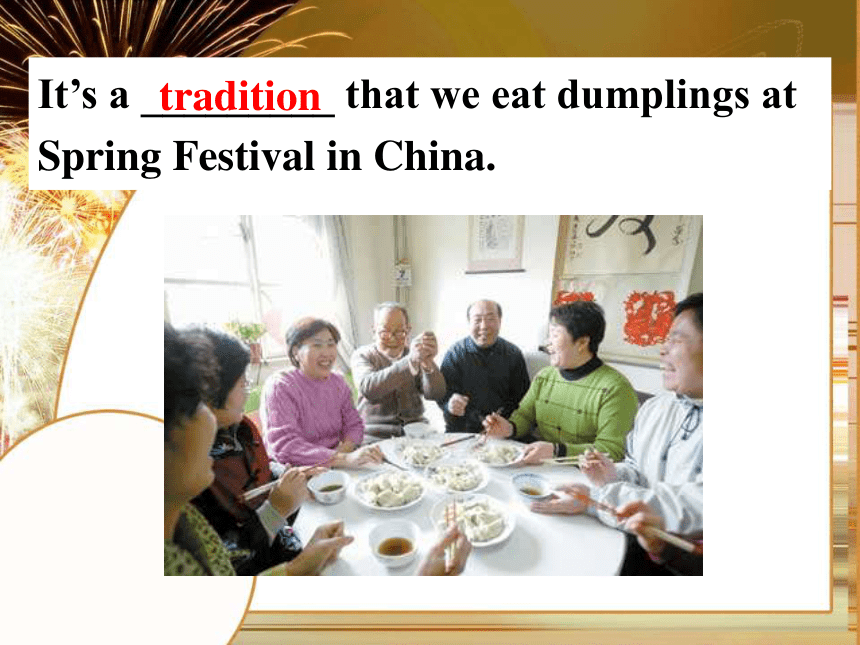

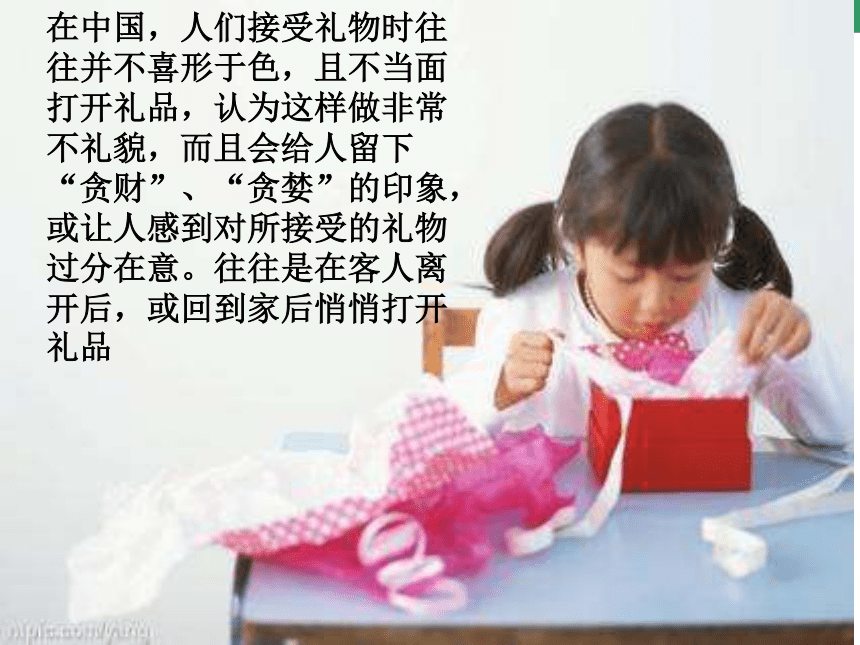
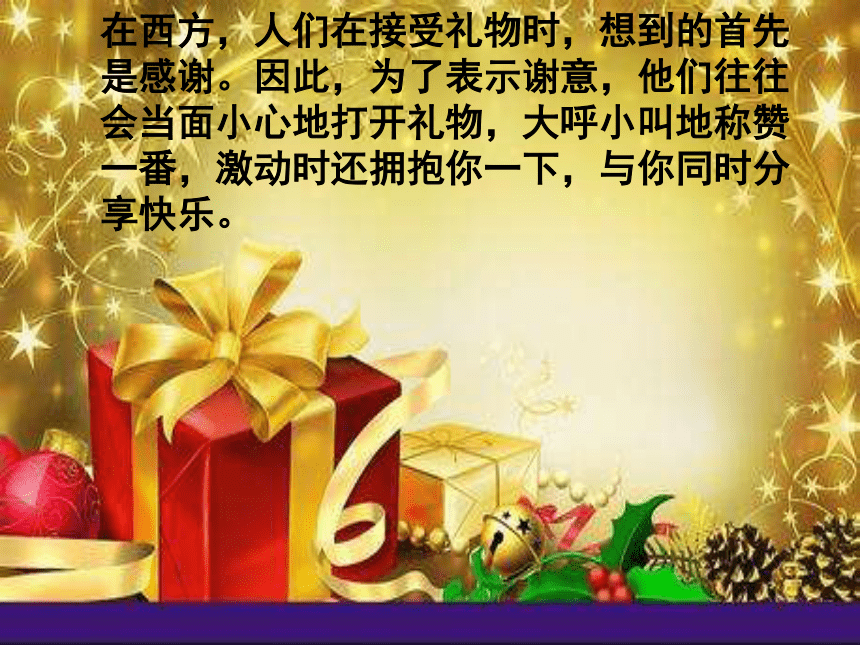
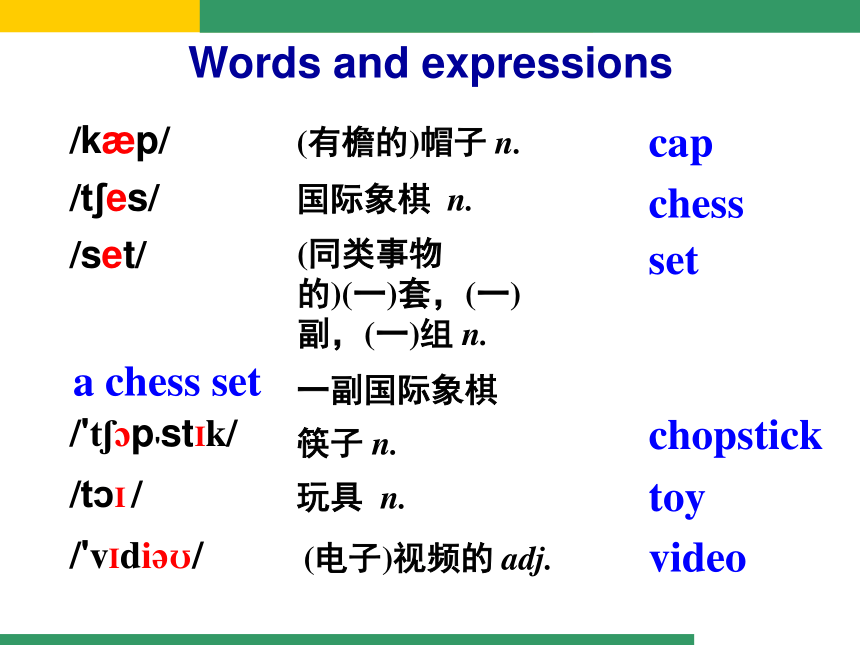
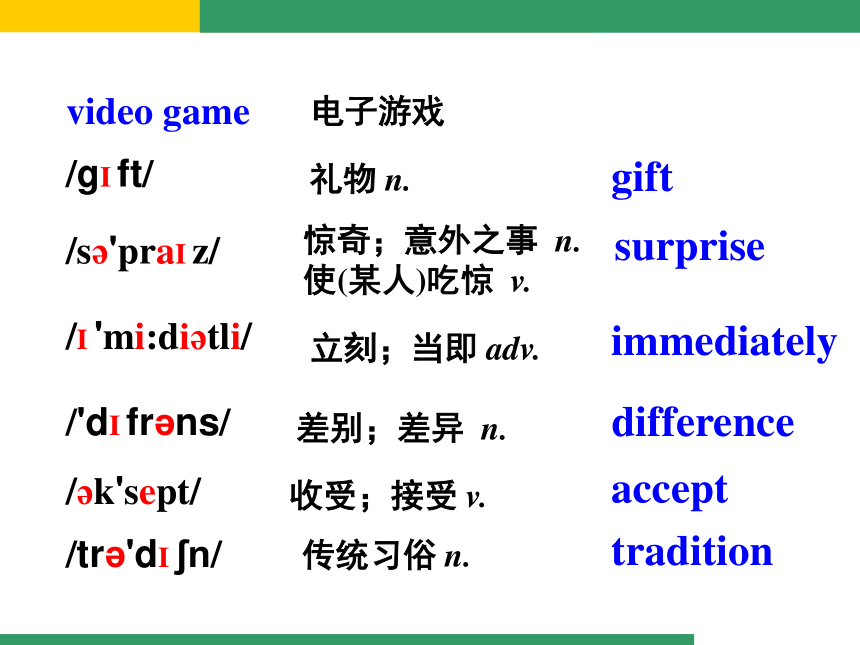

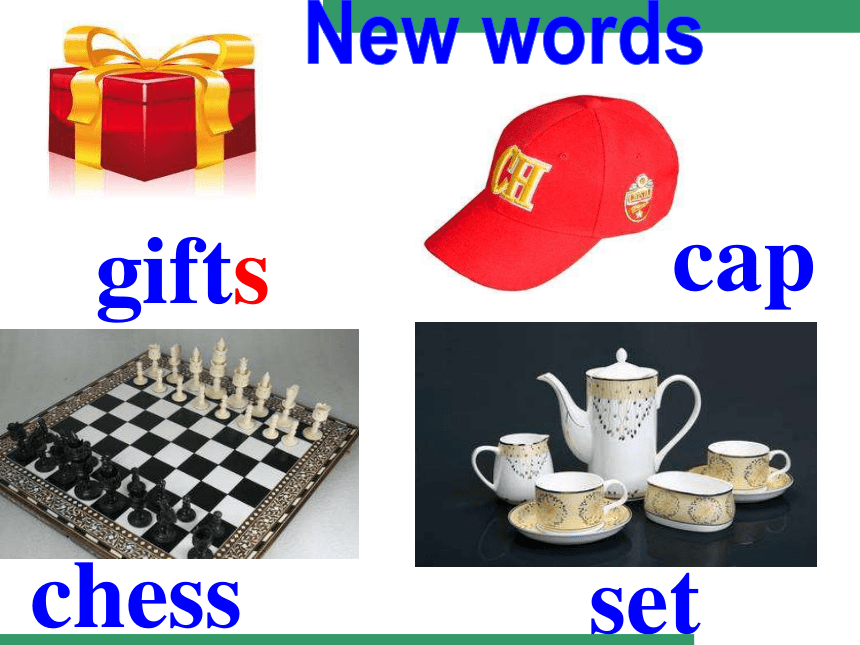
文档简介
课件71张PPT。Module 11 Way of life Unit 1
In China, we open a gift later.We often receive ______ when we have a birthday party.giftsLeadingLook at the picture and guess the word.We use __________ to have meals in China.chopsticksIt’s a _________ that we eat dumplings at Spring Festival in China.traditionWhat will you do when you receive a present?在中国,人们接受礼物时往往并不喜形于色,且不当面打开礼品,认为这样做非常不礼貌,而且会给人留下“贪财”、“贪婪”的印象,或让人感到对所接受的礼物过分在意。往往是在客人离开后,或回到家后悄悄打开礼品在西方,人们在接受礼物时,想到的首先是感谢。因此,为了表示谢意,他们往往会当面小心地打开礼物,大呼小叫地称赞一番,激动时还拥抱你一下,与你同时分享快乐。/k?p/
/t?es/
/set/
/'t??p'stIk/
/t?I /
/'vIdi??/
(有檐的)帽子 n.cap国际象棋 n.chess(同类事物的)(一)套,(一)副,(一)组 n.a chess setset一副国际象棋chopstickWords and expressionstoy(电子)视频的 adj.玩具 n. 筷子 n.videovideo game
/gI ft/
/s?'praI z/
/I 'mi:di?tli/
/'dI fr?ns/
/?k'sept/
/tr?'dI ?n/
电子游戏礼物 n.gift惊奇;意外之事 n.
使(某人)吃惊 v. immediately立刻;当即 adv. 差别;差异 n.difference收受;接受 v.accept传统习俗 n.traditionsurprise/I g'zɑ?mpl/
for example
/m?st; m?st/
/m?nθ/
/'sI?ri?s/
/teI st/
/Ik'spI?ri?ns/
例子;实例 n.example例如must必须;应该 v. aux.serious月;月份 n.认真严肃的;
不开玩笑的 adj.month有……的味道 v.
味道;滋味 n.tasteexperience经历;经验 n.giftscapchessNew wordssetchocolatetaste v. n.1.The chocolates taste sweet.
2.This kind of chocolate has a bitter taste.(v.)尝起来…后接adj.(n.)味道;滋味chopstickChinese people usually use chopsticks to eat.Sdictionarytoy accept
接受(主观)receive
收到(客观)我收到了他的花,但是我没有接受。I ____________his flowers, but I didn’t _____________them.receivedacceptsurprise n./v
To one’s surprise (n)
In surprise (n)
surprising adj.
surprised adj.He is _________ to hear the ___________news.
To his _______, he got a full mark in the English test.
I saw him going out of the classroom in _______.
What he said __________ me just now. 让某人惊讶的是
惊奇地
Sth令人惊讶的
Sb感到惊讶的 surprised surprising surprise surprise surprisedI.根据句意及首字母或汉语提示完成单词.
1.What a s________! I put my key here, but it has gone now.
2.The old man gave Jack some money, but he didn’t a________.
3The jiaozi________(尝起来)delicious. I want to have some more.urprise ccept tastes 4.Chinese________(传统)are quite different from the American ones.
5.In the US ,when you get a present ,you should open it i____________.
6. In China, when someone gives you a present, you should w_____ and open it later.traditions ait mmediately Listen and number the words and
expressions as you hear them.1234567Match the words and expressions in
Activity 1 with the pictures.gedbcfa预习检测: 用所给词的适当形式填空 1. The best time (visit) the New England is in September.
2. It’s bad for the children _____ (eat) too much junk food.
3. I need to do some (clean)this afternoon.
4. It’s a (surprise) news.
5.It’s often (rain) at this time of the year.to visitto eatcleaningsurprisingrainsListen to Activity 1 and answer the questions.What present do they want to buy for Lingling?1. When can people open the present in China?
They can open it later.
2. Where must people open the present immediately?
In the US.
3. Do people accept a present with both hands in the West?
No, they don’t.Read the dialogue and answer the questions.Choose the best answer for each sentence. In the USA, when someone gives you
a present, you must open it _______.
A. later B. immediately
C. five minutes
2. When you accept a present, you must use _____ in China.
A. left hand B. both hands
C. right hand3. When you accept a present, you can use
_____ in Britain.
A. both hands B. one hand C. a box
4. Hongbao in ____ paper is lucky.
A. white B. green C. red
5. You mustn’t do any ______ on the first
day of the Spring Festival.
A. shopping B. cleaning C. cooking1. Open a present immediately when you receive it.
2. Accept a present with both hands.
3. Use red paper for hongbao.
4. Do cleaning on the first day of the Spring Festival.
5. Break something during the Spring Festival.
6. Have your hair cut during the Spring Festival month.√√It is always a(n) (1) ________ to receive gifts from family members and friends. In China, we usually (2)_______ a gift with both hands and open it later. But in the West, people usually do not pay much (3) __________ to that. During the Spring Festival, there are many (4) _________. For example, people in the north of China eat lots of jiaozi. They (5) _______ great.Complete the passage with the words in the box.surpriseacceptattentiontraditions accept attention surprise taste traditionstaste3. Listen and readEveryday English Oh, you remember!
What a surprise!
It’s bad luck.
You can’t be serious!
Perfect!Important phrases1.do some cleaning 大扫除
2.be interested to do 对做某事感兴趣
3.What a surprise 好惊讶啊
4.pay much attention to 过分留意
5.for example 例如
6.bad luck 倒霉
7.had better not do 最好不做某事
8.have your hair cut 理发
9.On the first day of the Spring Festival 在春节的第一天
Check1.大扫除
2. 对做某事感兴趣
3.好惊讶啊
4.过分留意
5.例如
6.倒霉
7.最好不做某事
8.理发
9.在春节的第一天
do some cleaning be interested to doWhat a surprisepay much attention tofor examplebad luckhad better not do have your hair cutOn the first day of the Spring FestivalThen listen and read Betty: Happy birthday, Lingling.
Daming: Here’s your gift.
Lingling: Oh, you remembered! What a surprise!
Tony: You can open it!
Lingling: I don’t think I should open it now. In
China, we open a gift later.
Betty: But back in the US, we open a gift immediately.
Lingling: So what do I do?
Betty: You needn’t wait!
(Lingling opens her presents and finds a dictionary.)
Lingling: Oh, thank you. I really wanted one.
Betty: We’re happy you like it.
Tony: I noticed another difference. In China, you
accept a gift with both hands. But in the west,
we usually don’t pay much attention to that.
Betty: That’s interesting! I’m interested to know all
the Chinese traditions. Tell me more.
Lingling: There are a lot. For example, in my home
town, people say you mustn’t do any
cleaning on the first day of the Spring
Festival. And you mustn’t break anything.
It’s bad luck.
www.xkb1.comDaming: You must only use red paper for hongbao
because red means luck. And you’d better
not have your hair cut during the Spring
Festival month.
Tony: You can’t be serious!
Daming: And in the north of China, people eat lots
of Jiaozi!
Betty: Perfect! They taste great.
Tony: I like eating jiaozi too. Anyway, the Spring
Festival is still over a month away. Let’s
celebrate Lingling’s birthday first!
1. What’s a surprise!
surprise表示“惊奇,意外之事”。是名词。
e.g. — Although he is only ten years
old, he runs the fastest.
— What a surprise!
尽管他只有十岁,但他跑得是最
快的。多么神奇!Language points
1.How +形容词/副词+主语+谓语!
_________ lovely the baby is! 小孩子真可爱!
2.What + a/an +形容词+单数名词+主语+谓语!
____________ clever boy he is!
他是多聪明的孩子!
3.What +形容词+复数或不可数名词+主语+谓语!
_________cold weather it is! 多冷的天!
_________ beautiful flowers they are!
两步搞定所有感叹句!一______ 二_______HowWhatWhat aWhat 一、感叹句1 用How , What (a / an) 填空
________ delicious food it is !
________interesting film!
_________bad weather !
_________good day !
________tall the boy is !
_________good news it is !
_________beautiful clothes they are !
_________ nice teacher he is !
_________nice Tom is !
_________beautiful flowers they are !
_________ hard work !
_________ hard job !What
What an
What
What a
How
What
What
What a
How
What
What
What a2. I don’t think I should open it now.
我觉得我不应该现在打开它。
not + think,believe,…+ that 从句
在这种句式中,not从宾语从句的谓语动词的前面,转移到了主句谓语动词think,believe等的前面。即(否定前移)例如: I'm sorry,but I don't think I know you.
对不起,我想我并不认识你。 I don't believe he'll come.
我想他是不会来的。
否定转移2. …we open a gift immediately.
immediately adv. 立即;直接地
e.g. Mary answered Peter's letter
immediately.
玛丽立即给彼得回了信。3. For example, in my hometown, people say you mustn’t do any cleaning on the first day of the Spring Festival.
for example 例如
e.g. You can buy fruit here - oranges
and bananas, for example. 你可以在这里买水果,例如买柑
橘和香蕉。 4. You must only use red paper for hongbao because red means luck.
must表示“必须”,后面加动词原形。
mustn’t表示“禁止,一定不要”
e.g. You must go to school on time.
你必须按时上学。5. You can’t be serious!
serious adj. 表示“认真的,不开玩笑的”。
e.g.
— You got a full mark in the exam.
— You can’t be serious!
你考试必须拿满分。
你是开玩笑的吧!1. I don’t think I should open it now.
2. You needn’t wait!
3. You mustn’t break anything.
4. You must only use red paper for hongbao.
5. You’d better not have your hair cut during the Spring Festival month.Read and predict how the speaker will
pronounce the underlined words.Pronunciation and spaekingNow listen and check.1. I don’t think I should open it now.
2. You needn’t wait!
3. You mustn’t break anything.
4. You must only use red paper for hongbao.
5. You’d better not have your hair cut during the Spring Festival month.Read the sentences in Activity 5 aloud.1. I don’t think I should open it now.
2. You needn’t wait!
3. You mustn’t break anything.
4. You must only use red paper for hongbao.
5. You’d better not have your hair cut during the Spring Festival month.Think about what you must and mustn't/can't
do in the situations. Write notes.Now work in pairs. Say what you must and mustn’t/ can’t do.eat during the classwait for others to start the mealGrammar Focus 情态动词
must, can need等情态动词canhad bettermustneed(能)(最好…)(需要)(必须)have to(不得不)情态动词情态动词后面 + 动词原形情态动词没有人称和数的变化1I can not play basketball. I may buy / bought a computer. 2She can / cans ride a horse. Amy may buy a book.------------3否定式构成是在情态动词后面加 "not" I can play / played basketball. ---can(能)用法:① 表示能力 :He can speak a little English. Can you fly? ③ 表示请求或允许 : Can I help you? ② 表示猜测 :That can not be our English teacher,
because she has gone to Shanghai . could也可表示请求,语气委婉,主要用于疑问句,
不可用于肯定句,答语应用canCould I come to see you tomorrow? Yes, you can. (否定答语可用No, I'm afraid not.) {{{注意{用法:①表示请求或允许 :May I go home,please? (1)以may(表许可或请求)开头的一般疑问句,肯定回答用may,否定回答用mustn't或can't. (2)在疑问句中不用于第二人称 ② 表示可能性 :You may be right. No, you _________ {{may(可以)Yes, you may.注意might为may的过去式,但也可以代替may,
语气较为婉转客气或更加不肯定。 You might be right. mightmustn’t / you can’t.试比较 :● You may not smoke here.(不可以) 语气轻 ● You can’t smoke here.(不能)重 ● You mustn’t smoke here.(决不可)最重 can'tmay notmustn't↓用法:② 表示推测“肯定,一定” :① 表示义务、必要或命令 : You must come early tomorrow. ---Must I finish my homework first? They must be at home. The light is on. --- Yes, you must.
--- No, you don't have to/ needn't. {must(必须)注意must开头的疑问句,其否定回答通常用 don‘t have to
或needn’t 。而不用mustn't mustn't(禁止)③ 否定时表示 “禁止” :You mustn’t smoke here. 用法:It’s eleven o’clock . I have to go now .
It was getting dark. He had to finish the work first . I don’t have to go now .
He doesn’t have to finish the work first.have to(必须)注意have to 表示客观因素
We are very glad at the party , but it’s 11 , so we have to leave now .
must 表示主观因素
We must study hard to find a good job for ourselves .must(必须)My brother was very ill, so I call the
doctor in the middle of the night.
He said that they work hard. You don't have to tell him about it. You mustn't tell him about it. 你不一定要把此事告诉他。 你一定不要把这件事告诉他 .have tomusthad tomust
区别}had better意为“最好”,表示建议和劝告,
简略式为‘d better,否定式为had better not,
后面跟动词原形。
You had better go to see a doctor.
You’d better not stay here.
had better(最好)2) 表示肯定的猜测,常用于肯定句中,
意为 “一定是,必然……”。
e.g. Your sister must be a doctor in this hospital. ( 现在的猜测 ) 你的妹妹现在一定在这家医院当医生。
He must be reading newspapers in the reading room now.(正在进行的猜测)他现在肯定正在阅读室看报纸。1. — Could I borrow your dictionary?
— Yes, of course you _______.
A. might B. will C. can D. should
2. You ______ return the book now. You can
keep it till next week if you like.
A. can’t B. mustn’t C. needn’t D. may notC C
3. Johnny, you ______ play with the knife, you
______ hurt yourself.
A. won’t ; can’t B. mustn’t ; may
C. shouldn’t ; must D. can’t ; shouldn’tB www.xkb1.com4. --Will you stay for lunch?
--Sorry, _____. My brother is coming to see me.
A. I mustn’t B. I can’t
C. I needn’t D. I won’t
5. --May I pick a flower in the garden?
-- ________.
A. No, you needn’t B. Not, please.
C. No, you mustn’t D. No, you won’tB C
6. "Must I drive to his house and pick up the
children?" ?
"No, ??????? ." ? A. you shouldn't? B. you might not ?
C. you needn't ? D. you mustn'tC 7. There is someone knocking at the door. ???????
it be Tom? ? A. can? B. must? C. should? D. ought toA 1. — Could I borrow your dictionary?
— Yes, of course you _______.
A. might B. will C. can D. should
2. You ______ return the book now. You can
keep it till next week if you like.
A. can’t B. mustn’t C. needn’t D. may not
3. Johnny, you ______ play with the knife, you
______ hurt yourself.
A. won’t ; can’t B. mustn’t ; may
C. shouldn’t ; must D. can’t ; shouldn’t
4. --Will you stay for lunch?
--Sorry, _____. My brother is coming to see me.
A. I mustn’t B. I can’t
C. I needn’t D. I won’t
C C B B 5. --May I pick a flower in the garden?
-- ________.
A. No, you needn’t B. Not, please.
C. No, you mustn’t D. No, you won’t
6. "Must I drive to his house and pick up the
children?" ?
"No, ??????? ." ? A. you shouldn't? B. you might not ?
C. you needn't ? D. you mustn't
7. There is someone knocking at the door. ???????
it be Tom? ? A. can? B. must? C. should? D. ought to
C C A What a surprise!
don’t pay much attention to
be interested to do
do some cleaning
bad luck
on the first day of the Spring
had better not do
have sth done
好惊讶啊!
…不太留意
对去做某事感兴趣
做清洁
倒霉
在春节第一天
最好不做某事
使…被做
1.--Must I come before eight o'clock?
--No, you _______.”
A. can't B. don't
C. mustn't D. needn't
2.--Must I finish all the work before I leave?
--Yes, you _______ .”
A. must B. can
C. mustn't D. needn'tD练一练:A3. You ___ be quiet when you are in a library.
A. may B. can
C. will D. mustD中考链接1. — Who is the man over there? Is it Mr
Li?
— No, it ____ be him. Mr Li is much
taller. (2013河北)
A. mustn’t B. may not
C. can’t D. needn’tC2. — Could I look at your pictures?
— Yes, of course you ______.
(2013武汉)
A. could B. can C. will D. mightB3._____you pass me a pen? I’d like to write down the telephone number. (2012北京市海淀区)
A. Need B. Could
C. Must D. ShouldB4. — May I go to the cinema, Mum? (2013安徽)
— Certainly. But you ____ be back by 11 o’clock.
A. can B. may C. must D. needCWrite a passage about the school rules at your school.Homework:
In China, we open a gift later.We often receive ______ when we have a birthday party.giftsLeadingLook at the picture and guess the word.We use __________ to have meals in China.chopsticksIt’s a _________ that we eat dumplings at Spring Festival in China.traditionWhat will you do when you receive a present?在中国,人们接受礼物时往往并不喜形于色,且不当面打开礼品,认为这样做非常不礼貌,而且会给人留下“贪财”、“贪婪”的印象,或让人感到对所接受的礼物过分在意。往往是在客人离开后,或回到家后悄悄打开礼品在西方,人们在接受礼物时,想到的首先是感谢。因此,为了表示谢意,他们往往会当面小心地打开礼物,大呼小叫地称赞一番,激动时还拥抱你一下,与你同时分享快乐。/k?p/
/t?es/
/set/
/'t??p'stIk/
/t?I /
/'vIdi??/
(有檐的)帽子 n.cap国际象棋 n.chess(同类事物的)(一)套,(一)副,(一)组 n.a chess setset一副国际象棋chopstickWords and expressionstoy(电子)视频的 adj.玩具 n. 筷子 n.videovideo game
/gI ft/
/s?'praI z/
/I 'mi:di?tli/
/'dI fr?ns/
/?k'sept/
/tr?'dI ?n/
电子游戏礼物 n.gift惊奇;意外之事 n.
使(某人)吃惊 v. immediately立刻;当即 adv. 差别;差异 n.difference收受;接受 v.accept传统习俗 n.traditionsurprise/I g'zɑ?mpl/
for example
/m?st; m?st/
/m?nθ/
/'sI?ri?s/
/teI st/
/Ik'spI?ri?ns/
例子;实例 n.example例如must必须;应该 v. aux.serious月;月份 n.认真严肃的;
不开玩笑的 adj.month有……的味道 v.
味道;滋味 n.tasteexperience经历;经验 n.giftscapchessNew wordssetchocolatetaste v. n.1.The chocolates taste sweet.
2.This kind of chocolate has a bitter taste.(v.)尝起来…后接adj.(n.)味道;滋味chopstickChinese people usually use chopsticks to eat.Sdictionarytoy accept
接受(主观)receive
收到(客观)我收到了他的花,但是我没有接受。I ____________his flowers, but I didn’t _____________them.receivedacceptsurprise n./v
To one’s surprise (n)
In surprise (n)
surprising adj.
surprised adj.He is _________ to hear the ___________news.
To his _______, he got a full mark in the English test.
I saw him going out of the classroom in _______.
What he said __________ me just now. 让某人惊讶的是
惊奇地
Sth令人惊讶的
Sb感到惊讶的 surprised surprising surprise surprise surprisedI.根据句意及首字母或汉语提示完成单词.
1.What a s________! I put my key here, but it has gone now.
2.The old man gave Jack some money, but he didn’t a________.
3The jiaozi________(尝起来)delicious. I want to have some more.urprise ccept tastes 4.Chinese________(传统)are quite different from the American ones.
5.In the US ,when you get a present ,you should open it i____________.
6. In China, when someone gives you a present, you should w_____ and open it later.traditions ait mmediately Listen and number the words and
expressions as you hear them.1234567Match the words and expressions in
Activity 1 with the pictures.gedbcfa预习检测: 用所给词的适当形式填空 1. The best time (visit) the New England is in September.
2. It’s bad for the children _____ (eat) too much junk food.
3. I need to do some (clean)this afternoon.
4. It’s a (surprise) news.
5.It’s often (rain) at this time of the year.to visitto eatcleaningsurprisingrainsListen to Activity 1 and answer the questions.What present do they want to buy for Lingling?1. When can people open the present in China?
They can open it later.
2. Where must people open the present immediately?
In the US.
3. Do people accept a present with both hands in the West?
No, they don’t.Read the dialogue and answer the questions.Choose the best answer for each sentence. In the USA, when someone gives you
a present, you must open it _______.
A. later B. immediately
C. five minutes
2. When you accept a present, you must use _____ in China.
A. left hand B. both hands
C. right hand3. When you accept a present, you can use
_____ in Britain.
A. both hands B. one hand C. a box
4. Hongbao in ____ paper is lucky.
A. white B. green C. red
5. You mustn’t do any ______ on the first
day of the Spring Festival.
A. shopping B. cleaning C. cooking1. Open a present immediately when you receive it.
2. Accept a present with both hands.
3. Use red paper for hongbao.
4. Do cleaning on the first day of the Spring Festival.
5. Break something during the Spring Festival.
6. Have your hair cut during the Spring Festival month.√√It is always a(n) (1) ________ to receive gifts from family members and friends. In China, we usually (2)_______ a gift with both hands and open it later. But in the West, people usually do not pay much (3) __________ to that. During the Spring Festival, there are many (4) _________. For example, people in the north of China eat lots of jiaozi. They (5) _______ great.Complete the passage with the words in the box.surpriseacceptattentiontraditions accept attention surprise taste traditionstaste3. Listen and readEveryday English Oh, you remember!
What a surprise!
It’s bad luck.
You can’t be serious!
Perfect!Important phrases1.do some cleaning 大扫除
2.be interested to do 对做某事感兴趣
3.What a surprise 好惊讶啊
4.pay much attention to 过分留意
5.for example 例如
6.bad luck 倒霉
7.had better not do 最好不做某事
8.have your hair cut 理发
9.On the first day of the Spring Festival 在春节的第一天
Check1.大扫除
2. 对做某事感兴趣
3.好惊讶啊
4.过分留意
5.例如
6.倒霉
7.最好不做某事
8.理发
9.在春节的第一天
do some cleaning be interested to doWhat a surprisepay much attention tofor examplebad luckhad better not do have your hair cutOn the first day of the Spring FestivalThen listen and read Betty: Happy birthday, Lingling.
Daming: Here’s your gift.
Lingling: Oh, you remembered! What a surprise!
Tony: You can open it!
Lingling: I don’t think I should open it now. In
China, we open a gift later.
Betty: But back in the US, we open a gift immediately.
Lingling: So what do I do?
Betty: You needn’t wait!
(Lingling opens her presents and finds a dictionary.)
Lingling: Oh, thank you. I really wanted one.
Betty: We’re happy you like it.
Tony: I noticed another difference. In China, you
accept a gift with both hands. But in the west,
we usually don’t pay much attention to that.
Betty: That’s interesting! I’m interested to know all
the Chinese traditions. Tell me more.
Lingling: There are a lot. For example, in my home
town, people say you mustn’t do any
cleaning on the first day of the Spring
Festival. And you mustn’t break anything.
It’s bad luck.
www.xkb1.comDaming: You must only use red paper for hongbao
because red means luck. And you’d better
not have your hair cut during the Spring
Festival month.
Tony: You can’t be serious!
Daming: And in the north of China, people eat lots
of Jiaozi!
Betty: Perfect! They taste great.
Tony: I like eating jiaozi too. Anyway, the Spring
Festival is still over a month away. Let’s
celebrate Lingling’s birthday first!
1. What’s a surprise!
surprise表示“惊奇,意外之事”。是名词。
e.g. — Although he is only ten years
old, he runs the fastest.
— What a surprise!
尽管他只有十岁,但他跑得是最
快的。多么神奇!Language points
1.How +形容词/副词+主语+谓语!
_________ lovely the baby is! 小孩子真可爱!
2.What + a/an +形容词+单数名词+主语+谓语!
____________ clever boy he is!
他是多聪明的孩子!
3.What +形容词+复数或不可数名词+主语+谓语!
_________cold weather it is! 多冷的天!
_________ beautiful flowers they are!
两步搞定所有感叹句!一______ 二_______HowWhatWhat aWhat 一、感叹句1 用How , What (a / an) 填空
________ delicious food it is !
________interesting film!
_________bad weather !
_________good day !
________tall the boy is !
_________good news it is !
_________beautiful clothes they are !
_________ nice teacher he is !
_________nice Tom is !
_________beautiful flowers they are !
_________ hard work !
_________ hard job !What
What an
What
What a
How
What
What
What a
How
What
What
What a2. I don’t think I should open it now.
我觉得我不应该现在打开它。
not + think,believe,…+ that 从句
在这种句式中,not从宾语从句的谓语动词的前面,转移到了主句谓语动词think,believe等的前面。即(否定前移)例如: I'm sorry,but I don't think I know you.
对不起,我想我并不认识你。 I don't believe he'll come.
我想他是不会来的。
否定转移2. …we open a gift immediately.
immediately adv. 立即;直接地
e.g. Mary answered Peter's letter
immediately.
玛丽立即给彼得回了信。3. For example, in my hometown, people say you mustn’t do any cleaning on the first day of the Spring Festival.
for example 例如
e.g. You can buy fruit here - oranges
and bananas, for example. 你可以在这里买水果,例如买柑
橘和香蕉。 4. You must only use red paper for hongbao because red means luck.
must表示“必须”,后面加动词原形。
mustn’t表示“禁止,一定不要”
e.g. You must go to school on time.
你必须按时上学。5. You can’t be serious!
serious adj. 表示“认真的,不开玩笑的”。
e.g.
— You got a full mark in the exam.
— You can’t be serious!
你考试必须拿满分。
你是开玩笑的吧!1. I don’t think I should open it now.
2. You needn’t wait!
3. You mustn’t break anything.
4. You must only use red paper for hongbao.
5. You’d better not have your hair cut during the Spring Festival month.Read and predict how the speaker will
pronounce the underlined words.Pronunciation and spaekingNow listen and check.1. I don’t think I should open it now.
2. You needn’t wait!
3. You mustn’t break anything.
4. You must only use red paper for hongbao.
5. You’d better not have your hair cut during the Spring Festival month.Read the sentences in Activity 5 aloud.1. I don’t think I should open it now.
2. You needn’t wait!
3. You mustn’t break anything.
4. You must only use red paper for hongbao.
5. You’d better not have your hair cut during the Spring Festival month.Think about what you must and mustn't/can't
do in the situations. Write notes.Now work in pairs. Say what you must and mustn’t/ can’t do.eat during the classwait for others to start the mealGrammar Focus 情态动词
must, can need等情态动词canhad bettermustneed(能)(最好…)(需要)(必须)have to(不得不)情态动词情态动词后面 + 动词原形情态动词没有人称和数的变化1I can not play basketball. I may buy / bought a computer. 2She can / cans ride a horse. Amy may buy a book.------------3否定式构成是在情态动词后面加 "not" I can play / played basketball. ---can(能)用法:① 表示能力 :He can speak a little English. Can you fly? ③ 表示请求或允许 : Can I help you? ② 表示猜测 :That can not be our English teacher,
because she has gone to Shanghai . could也可表示请求,语气委婉,主要用于疑问句,
不可用于肯定句,答语应用canCould I come to see you tomorrow? Yes, you can. (否定答语可用No, I'm afraid not.) {{{注意{用法:①表示请求或允许 :May I go home,please? (1)以may(表许可或请求)开头的一般疑问句,肯定回答用may,否定回答用mustn't或can't. (2)在疑问句中不用于第二人称 ② 表示可能性 :You may be right. No, you _________ {{may(可以)Yes, you may.注意might为may的过去式,但也可以代替may,
语气较为婉转客气或更加不肯定。 You might be right. mightmustn’t / you can’t.试比较 :● You may not smoke here.(不可以) 语气轻 ● You can’t smoke here.(不能)重 ● You mustn’t smoke here.(决不可)最重 can'tmay notmustn't↓用法:② 表示推测“肯定,一定” :① 表示义务、必要或命令 : You must come early tomorrow. ---Must I finish my homework first? They must be at home. The light is on. --- Yes, you must.
--- No, you don't have to/ needn't. {must(必须)注意must开头的疑问句,其否定回答通常用 don‘t have to
或needn’t 。而不用mustn't mustn't(禁止)③ 否定时表示 “禁止” :You mustn’t smoke here. 用法:It’s eleven o’clock . I have to go now .
It was getting dark. He had to finish the work first . I don’t have to go now .
He doesn’t have to finish the work first.have to(必须)注意have to 表示客观因素
We are very glad at the party , but it’s 11 , so we have to leave now .
must 表示主观因素
We must study hard to find a good job for ourselves .must(必须)My brother was very ill, so I call the
doctor in the middle of the night.
He said that they work hard. You don't have to tell him about it. You mustn't tell him about it. 你不一定要把此事告诉他。 你一定不要把这件事告诉他 .have tomusthad tomust
区别}had better意为“最好”,表示建议和劝告,
简略式为‘d better,否定式为had better not,
后面跟动词原形。
You had better go to see a doctor.
You’d better not stay here.
had better(最好)2) 表示肯定的猜测,常用于肯定句中,
意为 “一定是,必然……”。
e.g. Your sister must be a doctor in this hospital. ( 现在的猜测 ) 你的妹妹现在一定在这家医院当医生。
He must be reading newspapers in the reading room now.(正在进行的猜测)他现在肯定正在阅读室看报纸。1. — Could I borrow your dictionary?
— Yes, of course you _______.
A. might B. will C. can D. should
2. You ______ return the book now. You can
keep it till next week if you like.
A. can’t B. mustn’t C. needn’t D. may notC C
3. Johnny, you ______ play with the knife, you
______ hurt yourself.
A. won’t ; can’t B. mustn’t ; may
C. shouldn’t ; must D. can’t ; shouldn’tB www.xkb1.com4. --Will you stay for lunch?
--Sorry, _____. My brother is coming to see me.
A. I mustn’t B. I can’t
C. I needn’t D. I won’t
5. --May I pick a flower in the garden?
-- ________.
A. No, you needn’t B. Not, please.
C. No, you mustn’t D. No, you won’tB C
6. "Must I drive to his house and pick up the
children?" ?
"No, ??????? ." ? A. you shouldn't? B. you might not ?
C. you needn't ? D. you mustn'tC 7. There is someone knocking at the door. ???????
it be Tom? ? A. can? B. must? C. should? D. ought toA 1. — Could I borrow your dictionary?
— Yes, of course you _______.
A. might B. will C. can D. should
2. You ______ return the book now. You can
keep it till next week if you like.
A. can’t B. mustn’t C. needn’t D. may not
3. Johnny, you ______ play with the knife, you
______ hurt yourself.
A. won’t ; can’t B. mustn’t ; may
C. shouldn’t ; must D. can’t ; shouldn’t
4. --Will you stay for lunch?
--Sorry, _____. My brother is coming to see me.
A. I mustn’t B. I can’t
C. I needn’t D. I won’t
C C B B 5. --May I pick a flower in the garden?
-- ________.
A. No, you needn’t B. Not, please.
C. No, you mustn’t D. No, you won’t
6. "Must I drive to his house and pick up the
children?" ?
"No, ??????? ." ? A. you shouldn't? B. you might not ?
C. you needn't ? D. you mustn't
7. There is someone knocking at the door. ???????
it be Tom? ? A. can? B. must? C. should? D. ought to
C C A What a surprise!
don’t pay much attention to
be interested to do
do some cleaning
bad luck
on the first day of the Spring
had better not do
have sth done
好惊讶啊!
…不太留意
对去做某事感兴趣
做清洁
倒霉
在春节第一天
最好不做某事
使…被做
1.--Must I come before eight o'clock?
--No, you _______.”
A. can't B. don't
C. mustn't D. needn't
2.--Must I finish all the work before I leave?
--Yes, you _______ .”
A. must B. can
C. mustn't D. needn'tD练一练:A3. You ___ be quiet when you are in a library.
A. may B. can
C. will D. mustD中考链接1. — Who is the man over there? Is it Mr
Li?
— No, it ____ be him. Mr Li is much
taller. (2013河北)
A. mustn’t B. may not
C. can’t D. needn’tC2. — Could I look at your pictures?
— Yes, of course you ______.
(2013武汉)
A. could B. can C. will D. mightB3._____you pass me a pen? I’d like to write down the telephone number. (2012北京市海淀区)
A. Need B. Could
C. Must D. ShouldB4. — May I go to the cinema, Mum? (2013安徽)
— Certainly. But you ____ be back by 11 o’clock.
A. can B. may C. must D. needCWrite a passage about the school rules at your school.Homework:
同课章节目录
- Module 1 How to learn English
- Unit 1 Let's try to speak English as much as possi
- Unit 2 You should smile at her.
- Unit 3 Language in use .
- Module 2 My home town and my country
- Unit 1 It's taller than many other buildings.
- Unit 2 Cambridge is a beautiful city in the east o
- Unit 3 Language in use .
- Module 3 Sports.
- Unit 1 Nothing is more exciting than playing tenni
- Unit 2 This year we training more carefully.
- Unit 3 Language in use .
- Module 4 Planes, ships and trains .
- Unit 1 He lives the farthest from school.
- Unit 2 What is the best way to travel.
- Unit 3 Language in use .
- Module 5 Lao She Teahouse.
- Unit 1 I wanted to see the Beijing Opera.
- Unit 2 It descibes the changes in Chinese society.
- Unit 3 Language in use .
- Module 6 Animals in danger.
- Unit 1 It allows people to get closer to them .
- Unit 2 The WWF is working hard to save them all.
- Unit 3 Language in use .
- Revision module A
- Module 7 A famous story
- Unit 1 Alice was sitting with her sister by the ri
- Unit 2 She was thinking about her cat.
- Unit 3 Language in use .
- Module 8 Accidents
- Unit 1 While the car were changing to red, a car s
- Unit 2 I was trying to pick it up when it bite me
- Unit 3 Language in use .
- Module 9 Population
- Unit 1 The population of China is about 1.37 billi
- Unit 2 Arnwick was a city with 200,000 people.
- Unit 3 Language in use .
- Module 10 The weathe
- Unit 1 It might snow.
- Unit 2 The weather is fine all year round.
- Unit 3 Language in use .
- Module 11 Way of life
- Unit 1 In China ,we open a gift later.
- Unit 2 In England, you usually drink tea with milk
- Unit 3 Language in use .
- Module 12 Help
- Unit 1 What should we do before help arrives?
- Unit 2 Stay away from windows and heavy furniture.
- Unit 3 Language in use .
- Revision module B
